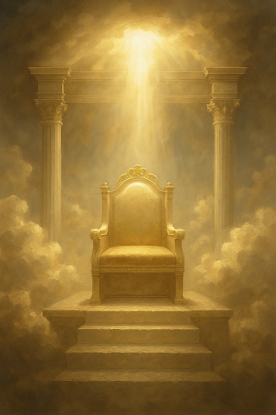A Kingdom Perspective on Growth, Grace, and Accountability
“For we must all appear before the judgment seat of Christ, so that each of us may receive what is due us for the things done while in the body, whether good or bad.”
In his second letter to the church at Corinth, Paul introduces the concept of the Judgment Seat of Christ. In chapter five, he expands on this idea—but for many of us, the notion of judgment and God can feel unsettling. The thought of being judged by God often stirs fear and discomfort.
Let’s take a fresh look at the Judgment Seat of Christ from a kingdom perspective. Growing up in church, I was taught that the saints would go before the Judgment Seat of Christ, while the world would appear before the Great White Throne Judgment. If you made it to the Judgment Seat of Christ, you at least knew you were going to heaven. That judgment, I was told, determined the crowns you would receive and your role in the new heaven and new earth. But the White Throne Judgment? That meant hell.
Today, however, I believe God is inviting us to see the Judgment Seat of Christ differently. It reminds me of the mercy seat in the Old Testament. What is this judgment really about? Is God keeping a running list of our wrongdoings? Is He recording every mistake, ready to display them on a giant screen after we die so we can relive every failure? Is that truly how God judges?I don’t believe so.
The Judgment Seat of Christ, to me, is about seeing Jesus as our standard—our rule of measurement. He is the only one to whom I should compare myself. My goal is to be who He was, to say what He said, to do what He did—and even go further by doing greater works. The Judgment Seat of Christ is about measuring my growth in Christ-consciousness and evaluating how far I’ve come in my spiritual journey.
As the Bible says, "Till we all come into the unity of the faith and of the knowledge of the Son of God, to a perfect man, to the measure of the stature of the fullness of Christ." The Judgment Seat of Christ is about embracing Jesus as the measuring stick. It’s about thinking His thoughts, speaking His words, performing His actions, and continuing His ministry. It’s about progressing spiritually—from an embryo to a fetus, a newborn, an infant, a toddler, a child, an adolescent, and finally, a fully mature adult in Christ.
This is the true measure of the Judgment Seat: my personal growth. Jesus is my standard. I’m not comparing myself to other people. That’s easy—I can always find someone doing better or worse. But when I compare myself to Jesus, "Let this mind be in you, which was also in Christ Jesus," I gain perspective. I see how far I’ve come—and how far I still need to go.
The Judgment Seat of Christ is about recognizing that growth is the goal. “And the child grew and increased in wisdom and stature, and in favor with God and people.” This judgment isn’t some far-off event waiting to happen after death. It’s happening here and now. The Bible says, "Do not be deceived: God is not mocked. Whatever a person sows, that they will also reap." The Judgment Seat of Christ is not about tallying up deeds after we die—it’s about living with awareness now. We are constantly reaping the consequences of our actions, decisions, and thoughts.
Right now, I’m standing before the Judgment Seat of Christ, evaluating myself so that I can become my best self and live my best life. It’s not about God keeping a record of good and bad deeds to decide our eternal fate. Jesus has already handled sin—cash the check! He has taken care of guilt, shame, and condemnation. The Judgment Seat of Christ is about personal growth and accountability. No one is exempt.
Scripture says, "Do not be deceived: God is not mocked. Everyone will see the Judgment Seat of Christ." This means we must all examine ourselves. Every one of us has room to grow. The law of sowing and reaping is always in effect. God has given us Jesus as our Wayshower—the perfect example of being fully human and fully divine. The real question is: Why didn’t you follow Him?
There are no exemptions. Everyone stands before the Judgment Seat of Christ—and that judgment is happening now.
(2 Corinthians 5:10)
Standard Rule of Measurement
Sowing and Reaping
Sorry, No Exemptions

Comments
Post a Comment